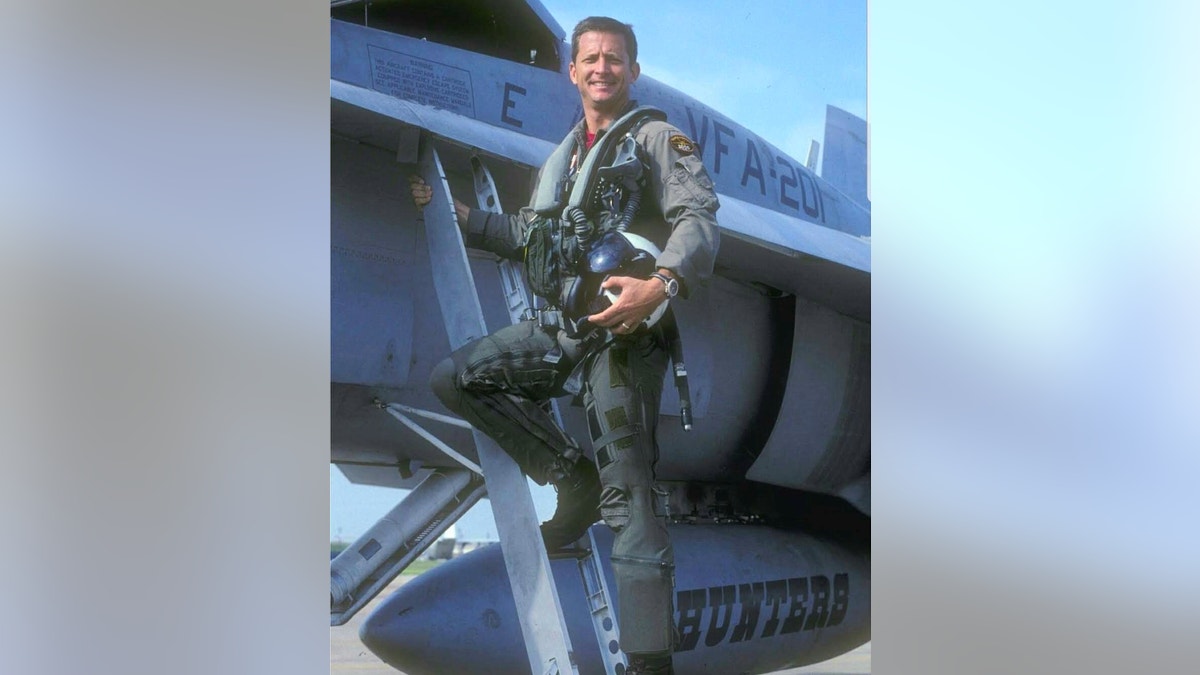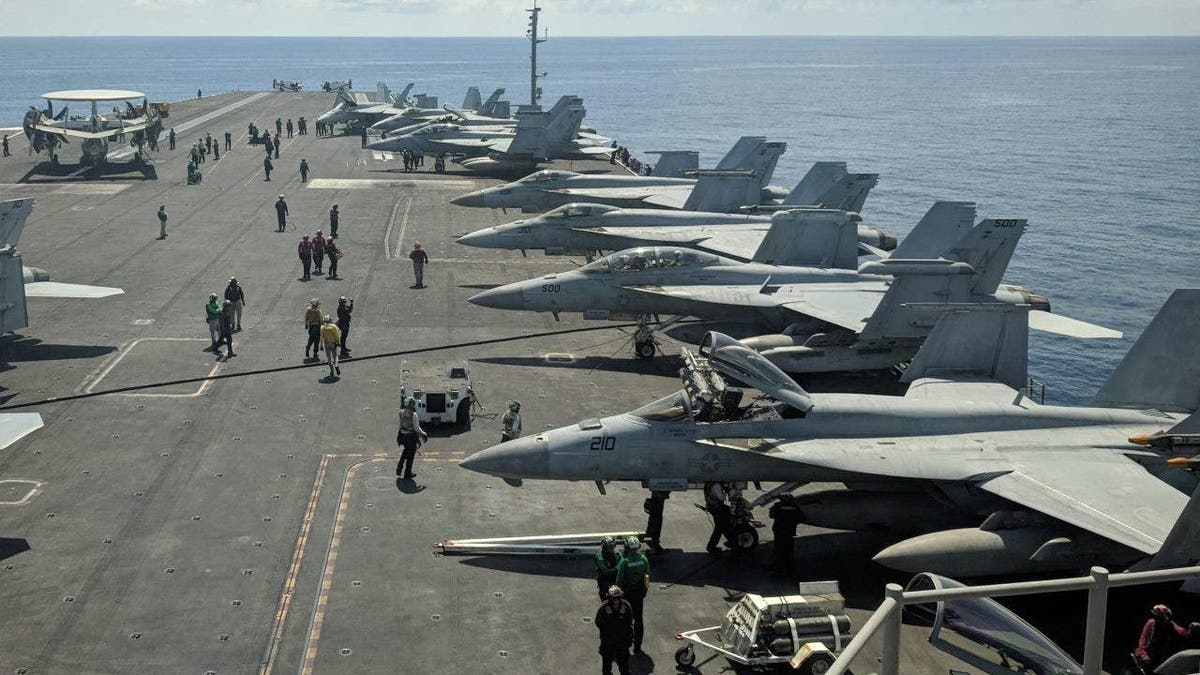'Like a car crash': Navy TOPGUN graduate and fighter pilot describes brain injuries he suffered from years of flying
Navy TOPGUN graduate and F/A-18 fighter pilot Matthew "Whiz" Buckley detailed the brain injuries he and many of his fellow pilots suffer as a result of years of high-speed flight maneuvers.
The U.S. Navy took on a secret project to learn more about brain injuries suffered by its most elite fighter pilots and now congressional lawmakers are demanding more information about the effort.
The Navy’s TOPGUN school launched Project Odin in the fall of 2024 to detect and treat an onslaught of symptoms consistent with brain injuries in fighter pilots, some of whom later died by suicide. But the program went on in secret, according to a New York Times report cited by House Oversight Chairman James Comer, R-Ky., and the rest of the Navy reportedly did not even know about it.
"Landing aboard an aircraft carrier, it's literally a car crash. It's the equivalent force of sitting in your driveway, in your car, and having a crane take you up to the second story and dropping you," said Matthew ‘Whiz’ Buckley, a TOPGUN graduate and F/A-18 fighter pilot, who told Fox News Digital in an interview he suffers from the brain injuries scrutinized by the project.
"The catapult shot, you go from zero to about 150, 200 miles an hour in a second to a second and a half. So your brain's kind of being jarred, you know, back and forward."
BERING AIR PLANE VANISHES IN ALASKA WHILE CARRYING 10 PEOPLE

"Landing aboard an aircraft carrier, it's literally a car crash. It's the equivalent force of sitting in your driveway, in your car, and having a crane take you up to the second story and dropping you," said Matthew ‘Whiz’ Buckley, a TOPGUN graduate and F/A-18 fighter pilot. (Matthew ‘Whiz’ Buckley )
"As a fighter pilot, pulling Gs, so I would fight the jet on the edge of consciousness," said Whiz, referring to the gravitational pull pilots experience when maneuvering tight turns in a jet.
"I’d merge with a bad guy in training, pull seven, eight, nine Gs. When you do that, the blood rushes out of your head."
Comer’s investigation will look at the Navy’s efforts to "mitigate possible physiological and psychological effects inflicted on certain naval aviators and flight officers, including those within the United States Navy Strike Fighter Tactics Instructor Program (TOPGUN)," as well as Project Odin’s Eye.
The project, which reportedly was adopted without formal approval from Navy Medical and Air Commands, "raises additional questions about the Navy’s knowledge of potential issues and whether it is acting to mitigate these issues in a comprehensive and effective manner," according to the Oversight letter to acting Navy Sec. Terence Emmert.
The letter requests a briefing of Oversight staff by next week and a litany of information on the mental health struggles and resources of aviators.
BLACK HAWK CREW LIKELY WEARING NIGHT-VISION GOGGLES BEFORE DEADLY DC MIDAIR CRASH, NTSB SAYS

High-speed takeoffs and landings generate immense amounts of pressure on the brain, according to Buckley (Reuters )
The Navy did not respond to requests for comment before publication time.
Buckley, founder of veterans' anti-suicide group No Fallen Heroes, said the Navy loves to capitalize on the "cool" factor of flying jets popularized with movies like Top Gun, but fails to warn pilots about the risks associated with years of high-speed flights.
The recent New York Times report detailed how a number of F/A-18 Super Hornet crew members suffered brain injuries after years of catapult takeoffs and dogfighting training.
Symptoms included insomnia, anxiety, depression and PTSD-like feelings.
NAVAL ACADEMY CLOSING DEI OFFICES TO ALIGN WITH TRUMP EXECUTIVE ORDERS: MEMO

This photograph taken on October 16, 2019, shows U.S. Navy F/A-18 Super Hornet multirole fighters and an EA-18G Growler electronic warfare aircraft (2nd R) on board the USS Ronald Reagan (CVN-76) aircraft carrier as it sails in South China Sea on its way to Singapore. (Photo by CATHERINE LAI/AFP via Getty Images)
Buckley recalled feeling confusion, forgetfulness, and being quick to anger – symptoms he at first attributed to the Navy’s drinking culture. He said many of those he flew alongside suffered back and neck injuries.
"I remember really being hard on myself, like. Well, what is wrong with you, man? You're a fighter pilot. You're on top of the world. What's wrong with you? So that would cause its own spiral," he said.
"In 15 years of flying fighters, I've lost three F-18 brothers to suicide."
Many Navy pilots go on to seek jobs in the commercial airline industry, where they often fail to disclose suffering brain injury symptoms on applications since it would keep them out of a job.
The Navy, of course, cannot stop training pilots under the brutal forces that air combat demands. But Buckley said it needs to do more to ensure former service members get adequate care for the toll of the job.
READ THE LETTER BELOW. APP USERS: CLICK HERE
"The military does an incredible job of training us to do some pretty awful things to another human," he said.
"But when they're done with us, they do a pretty crappy job of transitioning us back to being a human."
He said he fought the Veterans’ Affairs Department for years after they classified his injuries as not service-related.
"One day you go from flying an F-18 Hornet and having a top secret clearance, the highest level of trust of the government. And when you're out the next day, you're a liar, right?"
Buckley continued: "When I heard Tom Cruise agreed to do Top Gun 3, I'm like, what is it going to be? You know, Maverick faces his hardest enemy, the V.A.?
"Maverick had three ejections in combat experience, and still he’s going to be some schlep in the V.A. waiting ten months for an appointment."














































